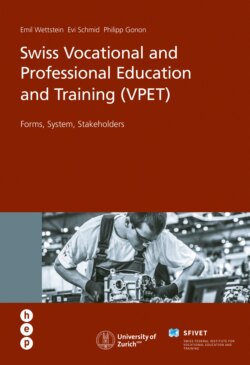Читать книгу Swiss Vocational and Professional Education and Training (VPET) - Philipp Gonon, Emil Wettstein - Страница 18
На сайте Литреса книга снята с продажи.
ОглавлениеPORTRAIT OF LUKAS SIGNER
Lukas Signer, 17,
is studying for the Federal Vocational Baccalaureate alongside his VET programme
clear
People achieve nothing without hard work
“Vocational training needs smart learners, too,” says master butcher Franz Fässler. For two years, he has been training a meat specialist (Fleischfachmann) who is attending preparatory courses for his Federal Vocational Baccalaureate and is, therefore, absent from the butcher’s shop more often than Fässler would sometimes like.
He sometimes hears a voice groaning inside him, at around five in the morning. At this time, 17-year-old Lukas Signer is sitting on a bike, there are eight kilometres between Jakobsbad and Appenzell, and his body is freezing with the cold of the night. Why am I doing this to myself, the voice asks, why did I choose a profession with such working hours? When he arrives at his host company, Lukas Signer knows the answer: “I am learning to be a meat specialist. We produce up-market, high-quality food. I like that.” Usually, the day begins with the production of sausages. “At seven, when other craftspeople are just starting their work, we have already accomplished a lot.” Then, Lukas Signer sits down for breakfast, together with the staff, up in his boss’s apartment. He has been warm for a long time.
Lukas Signer knows that people achieve nothing without hard work. As well as the VET programme, he attends the courses for the Federal Vocational Baccalaureate (FVB), which means a lot of additional work. On Tuesdays and on Wednesday afternoons, he attends the vocational school offering a preparatory course for the Federal Vocational Baccalaureate Examination (Berufsmaturitätsschule or BMS) at the Gewerbliches Berufs- und Weiterbildungszentrum St. Gallen (St. Gallen Vocational and Continuing Education Centre) – eleven lessons in total – and he spends Wednesday mornings at the vocational school in Winterthur. On the other three days, Lukas Signer works in the company, sometimes also on Saturdays. His apprenticeship trainer Franz Fässler says: “The Federal Vocational Baccalaureate is very important for vocational training. It is unacceptable for all talents to go to upper-secondary level baccalaureate schools. This requires that we, as a company, make a sacrifice by giving up our time. And it requires also compromises from the learners: on around ten Saturdays a year, Lukas Signer helps out when we need the staff.”
At the moment, Lukas Signer is boning meat, next to him his boss is doing the same work. With pinpoint accuracy the knives separate bone from meat and remove excess layers of fat, and with pinpoint accuracy the processed pieces find their way into the containers. Sometimes the apprenticeship trainer Franz Fässler stands beside Lukas Signer and gives him tips: to separate the skin from bone, the sharpening steel is more suitable than the knife because it does not damage the skin. Lukas Signer is grateful to be given such advice: “I am not yet fast enough, and speed is important, not least in the final examination. People notice that I am at school more often than others.” But the young butcher does not doubt that the FVB makes sense because it gives him the opportunity to study at a university of applied sciences, even if at the moment he is thinking more of becoming self-employed. Yet he would choose the FVB during an apprenticeship again.
“My knowledge of English and French is limited. With the FVB after the apprenticeship I would have been left by the wayside in these subjects,” he explains. In the VET programme of his profession, Lukas Signer does not learn any foreign languages.
The subjects at the FVB school do not have any direct relation to his profession, says Lukas Signer. Together with him, chefs, digital printing specialists and a pharmacist are acquiring the FVB, and in some subjects like English, mathematics and history, the class of seven people is joined by learners from the health care and social work VET programme. “It is even more complicated,” says Lukas Signer: “The FVB class in the first apprenticeship year consists of only two learners. Now, they usually attend school together with us, in a separate room. The teacher teaches at both locations and hands out assignments alternately.” The solutions for the tasks can be found on the internet.
With his work and school obligations Lukas Signer has little time left for learning, especially when he helps his brother and parents on the farm at the weekend. The learners can send their vocational instruction teacher questions by SMS at any time, and he answers these right away. He also seems to know that people achieve nothing without hard work.
